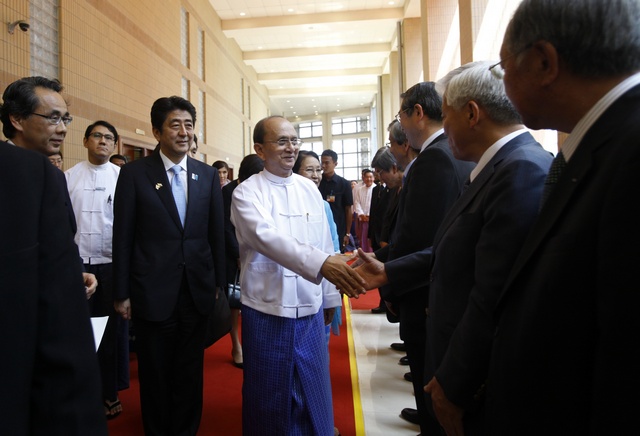Japan Inc. is making a move on Burma. Just a month after hosting opposition leader Aung San Suu Kyi, last week Prime Minister Abe paid a visit to Burma – the first such trip by a Japanese prime minister in 36 years. Accompanied by 40 Japanese corporate executives, Japan’s motive was clear: to help secure a new market for Japanese companies through boosting trade and investment ties with Burma.
In January, Japan wrote off a considerable portion of Burma’s debts to Japan and significantly expanded its aid programme to the country. On this trip Abe promised a further US$400 million in new loans, wrote off even more of Burma’s debt, and proposed bilateral cooperation on defence and security. He even went to inspect the future site of the Thilawa Special Economic Zone near Rangoon, the development of which is being promoted as a showcase for Japanese investment, aid and goodwill.
Most media reports attribute the recent surge in aid and investment by Japan to the liberalisation that has been occurring in Burma. But in fact Japan is reacting less to the “reforms” overseen by Thein Sein’s government than to the shift in US policy on Burma. The desire to invest and exploit was always there on the part of Japan, which generally does not care what kind of government runs a country as long as it is stable and creates an environment conducive to investment.
While Burma was under military rule, the Japanese government was under pressure from the US to withhold aid. It must have been frustrating for Japanese companies to see Chinese and other businesses going into Burma and taking what they believed would have been their share of the market, but at the same time they were reluctant to invest much in an unpredictable environment without support from the Japanese government. Now that there is nothing holding back either the Japanese government or the private sector, they are rushing in to make up for lost time to create a foothold for investment in Burma.
While investment and rapid development may benefit those directly involved in the projects and contribute to Burma’s GDP, they may also well cause serious harm to the environment and local communities. This is particularly true when projects involve large-scale infrastructure development or are located in conflict areas.
Furthermore, in Burma, ordinary people do not yet have the legal tools needed to address their concerns about potentially destructive development projects. To be sure, people can now voice their opposition to such development projects publicly and not necessarily be arrested. But in a society where there is a substantial power disparity between the government and the governed, and an absence of the rule of law, public demonstrations of opposition or displeasure are not enough to prevent real harm.
Even at Thilawa, nearly a thousand households received a written order from local authorities earlier this year telling them to vacate their houses and farms or face 30 days in detention. There has been no genuine discussion about resettlement plans or compensation. In some parts of the project site, local authorities have blocked the flow of irrigation water to nearby farms, effectively preventing farmers from cultivation during the dry season.
Despite repeated requests, local residents have not had satisfactory opportunities to voice their concerns. The situation is much worse in remote areas where there is even less information available about projects or room for monitoring by local and international NGOs.
Japanese government agencies and corporations have much experience dealing with efforts to prevent or mitigate negative impacts caused by development projects. As they enter Burma with their stated principles of transparency and accountability, they should be aware that many local communities are at a disadvantage, and therefore make genuine efforts to disclose information and to listen to the concerns and opinions of such communities.
This effort may seem time-consuming and even distressing given how many entities already are operating in Burma without heed to social and environmental impacts, but in the long run, a genuine effort to support the people of Burma will be a solid foundation for improving Japan-Burma relations in the future.
Yuki Akimoto is a director of BurmaInfo (Japan), which provides crucial information about human rights and environmental issues in Burma in Japanese. She is the author of several publications including “Opportunities and Pitfalls: Preparing for Burma’s Economic Transition”
-The opinions and views expressed in this piece are the author’s own and do not necessarily reflect DVB’s editorial policy.



